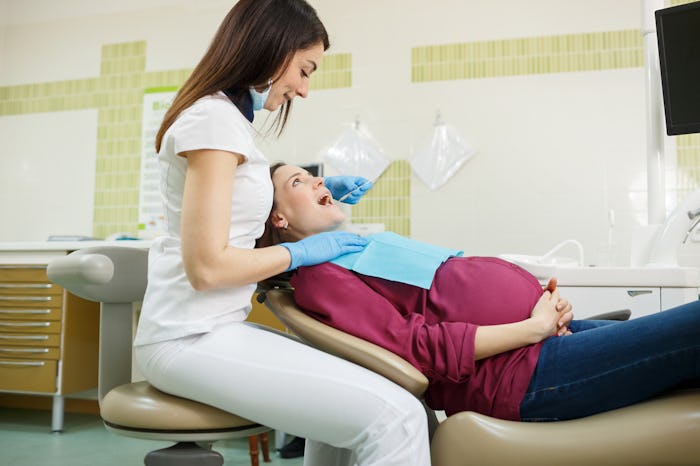Life

Here's The Deal With Root Canals & Other Dental Procedures During Pregnancy
The list of things you can’t do during pregnancy is long and sometimes annoying. You have to give up some of your favorite food and drinks, and you have be to extra careful when partaking in thrilling or strenuous activities. You may also hear that certain dental procedures should be avoided, but if you have been having intense tooth pain that requires a root canal, you may be confused. Although they may be painful, root canals are safe procedures in general, but can you get a root canal during pregnancy? Is it even safe?
If you have been suffering from tooth pain, you’ll be happy to know that you can safely get a root canal during pregnancy, and it’s actually better to get it done sooner than later. In an interview with Romper, Dr. Jarod Brown, DDS, MD, a board-certified oral and maxillofacial surgeon at Utah Surgical Arts, says that it’s more beneficial for a mother to undergo a root canal during pregnancy than to wait until delivery because bacteria from the tooth, if not removed, can enter her bloodstream and can compromise her pregnancy.
Tooth pain can be unbearable, and if you’ve been told you require a root canal, it is probably because your tooth needs immediate treatment. Root canals aren’t just run-of-the-mill procedures, and they’re usually only required in emergency situations. According to the American Association of Endodontists (AAE), root canals are needed when the roots of your tooth are inflamed or infected.
To treat your infected tooth, your dentist will clean out and disinfect your tooth’s root canals, and then fill it with a sealant for protection. If you don’t treat an oral infection, the bacteria can spread through your body, noted Your Dentistry Guide, and increase your risk for pregnancy complications.
The procedure itself is not a concern during pregnancy, but the method used to numb or block out the pain can be. Dr. Brown says that he recommends that pregnant women should only have root canals under local anesthesia and that IV sedation would have to be postponed until after the delivery of the baby. Anesthetics are generally safe during pregnancy, noted the American Dental Association (ADA), and their own research found that there is no evidence of anesthetics (like lidocaine shots) doing any harm to the baby or the mother.
In order to see what is going on inside your gums, your dentist may suggest you get an X-ray, which is often viewed as being harmful during pregnancy. But it turns out that dental X-rays can actually be safe if done properly. “Dental X-rays, which are often required for various dental and oral surgery procedures,” explains Brown, “are considered low risk during pregnancy with the appropriate draping of a lead apron." When you go in for a dental X-ray, your dentist or dental hygienist will likely cover your abdomen with a leaded apron and your neck with a leaded apron during the procedure, noted the ADA, which will minimize the radiation exposure to your baby and your thyroid glands.
It seems that the whole “avoid the dentist” ideology during pregnancy is outdated, and it is actually beneficial for pregnant women to go in for regular checkups so they can stay on top of their dental health, noted the ADA. Aside from a checkup, if you are in serious pain, do not hesitate to call your dentist for an evaluation. Just make sure to let the office know that you are pregnant so they can take the precautions needed to ensure your visits and procedures are safe for you and your baby.
Check out Romper's new video series, Bearing The Motherload, where disagreeing parents from different sides of an issue sit down with a mediator and talk about how to support (and not judge) each other’s parenting perspectives. New episodes air Mondays on Facebook.